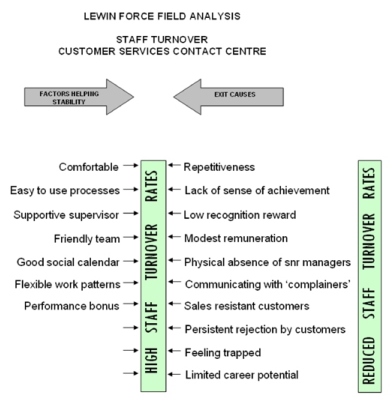We were asked…
“What kind of questions do you think we should be asking at exit interviews to find out why staff leave our call centre?
Our attrition rate is just under 30%, and while I know other call centres have higher churn than that, I think it’s important to understand where we’re going wrong.
What I don’t want is to ask the kind of questions that will encourage leavers to answer with bog-standard answers – like: “I really enjoyed my time here, but I wanted a new challenge”. Can you therefore recommend a line of questioning that will get straight answers without intimidating people at the same time?”
Use a Lewin Force Field as a Framework
Exit interviews are perceived by many managers as a necessary chore that has the potential to be an uncomfortable activity for both participants in the discussion. Like most processes, exit interviews rarely take in to account the complexities of the emotional drivers of the participants.
We know from our extensive work in contact centre environments that key drivers for employment change include:
- Repetitiveness.
- Lack of sense of achievement.
- Low recognition reward.
- Modest remuneration packages.
- Communicating on a daily basis with ‘complainers’.
- Communicating on a daily basis with customers who are ‘sales-resistant’.
- Persistent ‘rejection’ in outbound telesales roles and inbound up-selling roles.
- A feeling of being ‘trapped’ in the role.
- Limited opportunities for career development.
These emotional drivers may or may not be part of the reason for your employees deciding to leave. In fact, we can only find out by asking really good questions within a meaningful context.
Our guidance is to be honest with the employee and to context-set at the beginning of the discussion. Explain that the organisation is concerned when people leave because it impacts on the ability of the business to maintain service standards and unsettles the remaining colleagues. Say you would really like to understand what caused the employee to make his/her decision to leave and to put right any organisational factors that may have contributed to his/her decision.
One way to do this is to use a Lewin force field as a framework to refer to during your discussion. This has the effect of making the interview a third party discussion about how you could keep your people longer. The employee is acting as a consultant. What are the factors that keep people? What might make them think of moving on? By asking the employee about this broader organisational viewpoint, he/she can answer from what the therapists call a ‘dissociated’ position – where the discussion is not about them as individuals, but more about people in the business generally. It places a comforting ‘distance’ between them and the reason for leaving. This will almost certainly produce more honesty and openness.
By showing the force field (see illustration, below) and explaining how it impacts on staff retention, you can ask good questions like: “What is helping us to keep people?”; and “What else is helping us to keep people?”

Note that asking “Is there anything else?” is a tentative question format that makes it easy for the interviewee to answer: “No”. Always assume that there is another suggestion coming until they really do dry up.
The flip-side of questioning is about the resisting forces that are hampering your ability to maintain a higher stability rate. Try questions like: “What do you think is causing us to lose people?” (Note the present tense; this indirect suggestion relates directly to the employee with whom you are talking.) Also: “What else do you think is causing us to lose people?” (Note that the present tense has been used here again.)
On occasions the employee will give a “Don’t know” answer. Their thinking is often revealed by a simple solution-based question. For example: “I know you don’t know, but if you did know what would you say is causing us to lose people?”
With the right questions asked within a context that is meaningful and that is perceived to be about ‘others’, people will bring forth all sorts of valuable information about your business that you didn’t know. As Robert Townsend said: “Ask the people – they know where the wheels are squeaking!”
Contributed by: Nick Drake-Knight
Departing Employees Provide a Rich Source of Objective Feedback
.jpg)
Departing employees are liberated, and as such provide a richer source of objective feedback than employed staff do when responding to normal staff attitude surveys. However, should the departing employee be vague or superficial, do not be frightened to use the word ‘why’ to probe. This is not a ‘cover your arse’ procedure, but a genuine exercise in learning.
Also questions beginning with ‘what’ and ‘how’ are better for getting people to think and convey their views to you properly and honestly. Steer clear of ‘closed’ yes/no questions unless you require specific confirmation about a point and do not use ‘who’ as it will create a witch-hunt.
No two organisations are the same. For this reason it is important to define questions that will help you gain a greater understanding of your company’s culture, work ethics and people. Asking the same set of systematic questions will help define trends that are the cause for employee churn.
Questions that I recommend include:
- What is your main reason for leaving?
- What are the other reasons for you leaving?
- What could have been done early on to prevent the situation from developing?
- How would you have preferred the situation to be handled?
- What support would you have liked or needed that you did not get?
- What effect would this have had?
- If you were CEO of this organisation, charged with growing it for the long-term, what would you do tomorrow?
- If you joined again next week, what would you do differently?
Contributed by: Karl
Author: Jonty Pearce
Reviewed by: Jo Robinson
Published On: 25th Jul 2006 - Last modified: 20th Jan 2026
Read more about - Call Centre Questions, Attrition, Call Centre Answers, Career, Nick Drake-Knight




































